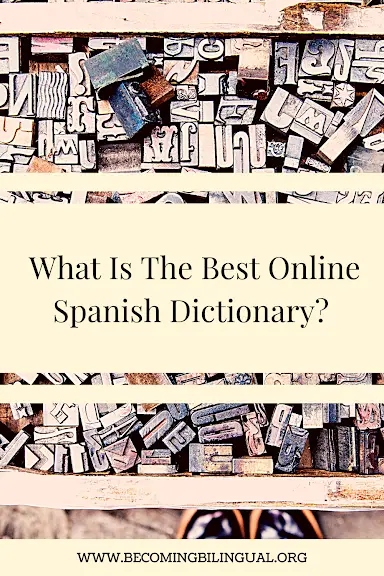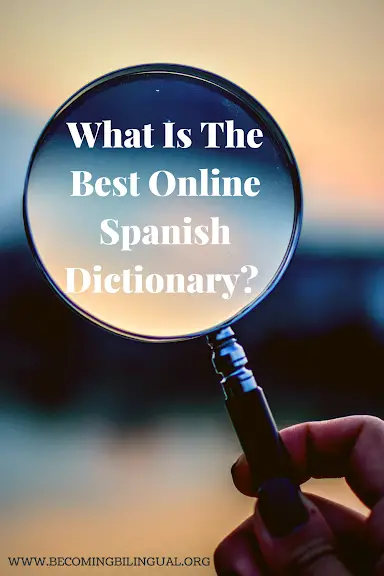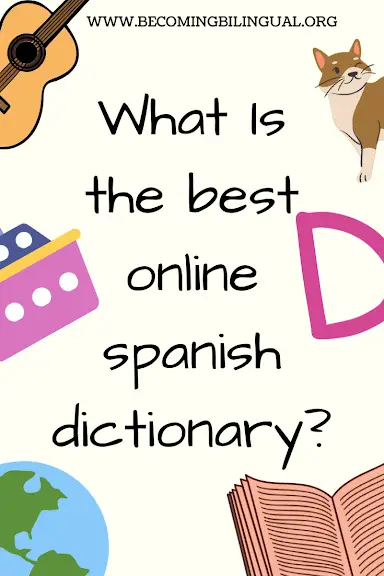What Is The Best Online Spanish Dictionary?

Last Updated on January 18, 2021 by Reina Victoria
As a non-native Spanish speaker there are a lot of Spanish words and phrases that I don’t know – like a lot!
I think one of the biggest challenges that all non-native speakers face is building their vocabulary. There are so many things that I’d like to say to my daughter – especially as she’s getting older and constantly asking questions– and I just don’t have the language for it.
Other than doing everything I can to just acquire more Spanish language and vocabulary, I often turn to the dictionary to help me.
Table of Contents
Building My Spanish Vocabulary
There are a lot of Spanish dictionary options around, but my preference has always been for WordReference.com.
Having a good dictionary to reference when you’re learning a language is so important. You want to have quick access to reliable pronunciation and a source with multiple definitions so that you get a true translation of what you’re trying to say.
WordReference.com has been a great site for me for so many reasons.

Here’s What I Like About Word Reference
Words and Phrases/ Discussion:
One of the best parts of WordReference is that you can search for words AND phrases. This is especially helpful when the word that you’re looking up has several different definitions when combined with other words. For example, “dar”. If you type in “dar” to google translate it says, “give”. When you look on WordReference it breaks down the tranlsations into “Principal Translations” (the most common ways to use ‘dar’), “Additional Translations” and “Compound Forms”.
In the “Compound Forms” section, you can see pages of common phrases that use ‘dar’ like ‘dar a luz’ (to give birth). At the bottom of the page is a section called, “Discussion/Forum”. This section has been really helpful as a Spanish learner as well. Here, users can post questions about the word, asking for translations for specific conjugations, combinations, or better understanding. The site is so well used that there are tons of forums and answers come quickly.
Countries:
As a non-native Spanish speaker, I get Spanish resources from all over, independent bookstores, Netflix, YouTube, Amazon, wherever I can find them. This means that the Spanish language content that we’re getting could be from Spain, Central America or South America. I know that there are some families who select to only get resources from one specific country, due to their heritage or personal preference. Since I collect materials from wherever I can, there are a lot of duplicate words that we know and use like, “gusano” and ‘lombriz” (worm) because we see/hear them both ways in the various resources that we have.
On Word Reference, when you look up a word, you can see translations for what is most commonly used in different countries. This allows you to see which country the word you’re using is most commonly used in, and allows you to select for the Spanish word that fits with what you want to practice. For example, when I look up “kitchen counter” I see:
Spain – encimera
Argentina – mesada
Columbia – meson
Venezuela – tope
I can now choose the Spanish word that I would like to use in my home, or better understand where a resource I have is from.
Pronunciation:
This is clutch! As someone who’s still learning Spanish, having a resource that tells me how to pronounce the word is super important. At the top of the page is a section where you can hear the pronunciation of the word you’re looking up and, in some cases, you can select the accent.
For example, this past week my daughter was looking at a book with a platypus and the Spanish word was “ornitorrinco”. We jumped on WordReference and plugged it in and heard the pronunciation in 3 different accents, Mexican, Spanish, and Argentinian, and practiced saying it until we felt like we were comfortable with it.
Sentences:
Many of the words also have example sentences with them that are given in both Spanish and English. This is helpful to see how the word/phrase works in context and can give you an idea for how to use it. When we look up, “dar a luz” we can see an example sentence:
Carla dio a luz un bebe sano.
Carla gave birth to a healthy baby.
The sentence option can also help you get an idea of how the word conjugates, which can be helpful to see in context.

If you’re looking for a good dictionary resource, I highly recommend checking them out! WordReference also includes translations for dozens of other languages and are just as thorough.
Happy learning!
Don’t forget to subscribe here and get my latest posts and resources delivered directly to your inbox!
1 thought on “What Is The Best Online Spanish Dictionary?”